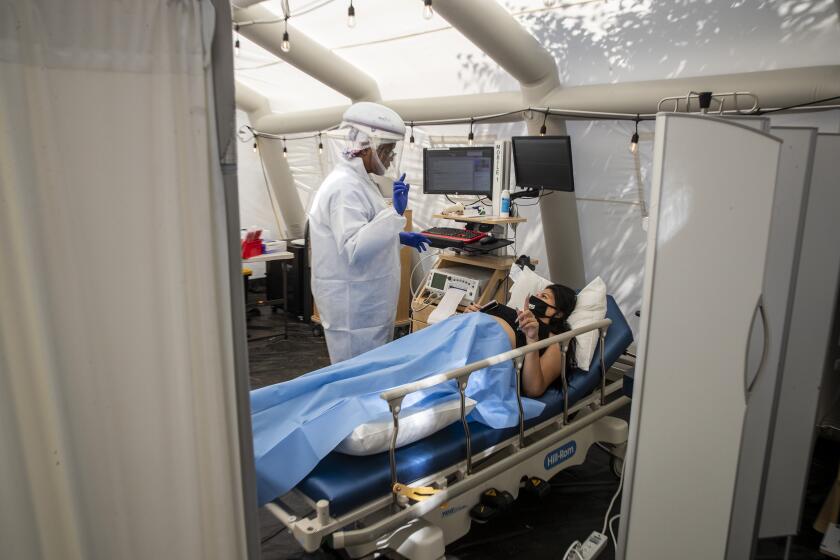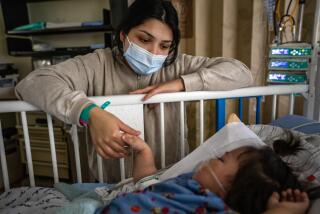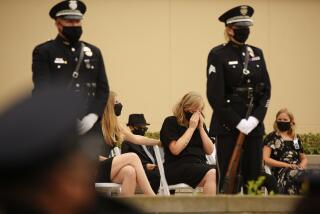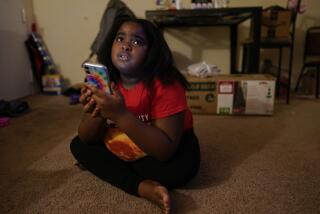These nurses work in a hospital ‘hot zone.’ The virus stalks them as they return home

- Share via
There’s red tape running along the floor of the coronavirus unit at St. Jude’s Medical Center in Fullerton.
It’s a clear line of demarcation. On one side, the cold zone, where only a surgical mask, scrubs and shoe coverings are necessary. On the other, the warm zone, where the gloves come on. And the N95 mask. And the gown. And the hairnet. And the face shield.
Another step through glass doors and it’s into the hot zone, where coughing patients in green-patterned gowns await.
It’s outside this unit, in an area not marked by red tape or glass doors, that worries the nurses of “4 North” most.
It’s home: Where their kids play and their spouses sleep. Where PPE are only letters of the alphabet for toddlers learning their ABCs.
As the pandemic rages on and cases climb throughout California, once again one of the nation’s hot spots, the answers remain unclear.
In the meantime, the nurses forge ahead.
The Associated Press spent several days in the coronavirus unit at St. Jude’s and followed four nurses and their families after their shifts were over.
Here are their stories, from work and home:
******
Sarvnaz Michel feared for her family’s safety.
She had just given birth to her youngest son, Arshan, prematurely and was supposed to return to work as a nurse on Valentine’s Day.
The coronavirus pandemic was slowly making its way to the United States and information was scarce.
Michel took six weeks of unpaid maternity leave to buy time. She started a new job at St. Jude’s in March, returning to a very different field.
A nurse at an upscale care center in L.A. died from COVID-19 after expressing concern to her mother and sister about the admission of a new patient to the locked-down facility.
Her older son, 2-year-old Leonidas, now knows not to hug his mother when she first gets home. He’ll sit outside as she showers after her shift, chattering about his day.
But there are things she can’t tell him about hers, like the time she spent three hours alone with a patient as she died. Like when her own uncle died in Iran, succumbing to the virus within two days.
Instead, she teaches her son how to give “air hugs.”
“I love them to death, but did we make a mistake, having kids and bringing them into this world?” Michel pauses. “I never doubted before.”
“You just want to make sure they’re safe.”
******
For the month of April, the Cushing family lived apart.
Spencer Cushing spent his days at St. Jude’s as a nurse caring for “step-down” patients recovering from the most serious COVID-19 symptoms. When his shifts were over, though, he wouldn’t go home to his wife, Eleanor, and young sons, 3-year-old James and baby Walter.
The reports from New York were frightening: Hospitals overwhelmed. The death toll climbing.
Was California next?
“We weren’t sure what was safe,” Cushing said. “But we knew what we were doing was the safest.”
So he rented an apartment, returning there after his shifts as Eleanor put the boys to bed alone at their home.
James began sleepwalking. Walter grew four new teeth and learned to roll over.
After a month, Cushing came home. James stopped sleepwalking and began preparing for his 4th birthday.
“I’m glad you’re here, Dad,” he would tell his father. “I’m really glad you’re here.”
******
Michele Younkin watched a man die.
The 28-year-old nurse knew it was coming. Comfort care had been arranged. His family, covered in PPE, was there. The medications to relax him were ready.
It was time.
Coronavirus hospitalizations in California are at an all-time high. Doctors and nurses at some hospitals say their long-feared nightmare has arrived.
She took her 65-year-old patient off the machine that was helping him breathe. She held the man’s wife close. She shed tears that clung to her face shield.
“Times like these, you will remember this,” Younkin’s grandmother, a nurse during the polio epidemic, told her. “You don’t forget them.”
Her career has forced her to blur and blend her two lives. She wondered if she should move out of her home to keep her infant son and husband safe.
“The thought of infecting either of them or my family,” she said. “It’s crazy.”
The pandemic has forced conversations that no young parents should have. They talk about what would happen if she were infected and hospitalized.
“If I were to die, don’t come,” Younkin told her husband emphatically. “Don’t risk yourselves.”
******
When Jackie Vargas is in the hospital, she feels safe.
She wears her glasses instead of contacts so she doesn’t have to touch her eyes. She swaps her sneakers out for glittery black clogs so she doesn’t have to handle shoelaces. She seals her N95 mask in a Tupperware-like container between patients so it’s stored away from germs in the air.
It’s at home where the anxiety escapes.
She doesn’t hug her mother-in-law, who is taking care of Vargas’ younger kids. Through a glass door, she visits her own mom and oldest daughter, Kaila, who has already had the virus and is staying with her grandma.
The ICU nurse who has cared for dozens of fevered, sick patients could do nothing more than monitor her 20-year-old daughter’s fever over FaceTime.
She avoids kissing her younger children’s faces and lingering too long at bedtime, but she knows it might not be enough.
“I don’t know where there’s a safe place for them to go,” she lamented.
So she goes back to the hospital.
More to Read
Sign up for Essential California
The most important California stories and recommendations in your inbox every morning.
You may occasionally receive promotional content from the Los Angeles Times.














